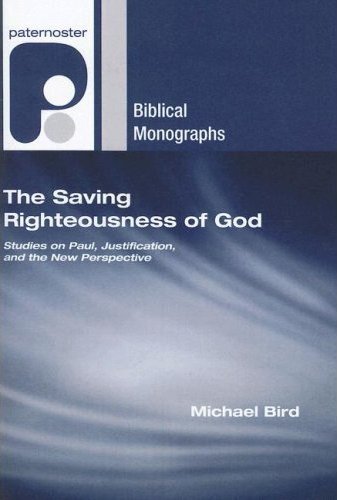Several weeks ago, as I was sharing about some of the better books I read in 2010, I put together an emotionally stirring post in which I discussed three different books on or related to the doctrine of Justification.
However, there was one book on the subject that managed to slip through the cracks. And normally, I wouldn’t feel the need to mention it here, because honestly… no one really cares. But since this blog is as much for me as it is for you, I’m coming back to it for the sake of completeness.
If I haven’t mentioned Scot McKnight around here, my apologies. He is someone worth being familiar with. He maintains a popular Christian blog. He is a professor in New Testament at North Park University. He writes prolifically on both an academic and popular level. Add to all that a busy speaking schedule at various conferences and such. Think of him as a North American version of N.T. Wright. I think he would take that for the compliment it is meant to be.
Anyway, if you are only going to read one book on Justification/Atonement, his is the the one.
I know I said that Michael Bird’s was the understanding of Righteousness/Justification/Atonement that I found most compelling, and it is. But no one is reading that. You’ve got the problem with the cover. But let’s be honest, the only people picking up this book didn’t even notice that there was a cover – myself included. That is to say, the book is all content and written for the extreme Bible nerd.
The beauty of McKnight’s A Community Called Atonement is that you get many of the same ideas, but in a much more accessible way. That isn’t to say it is dumbed down. Not in the least. It is just that McKnight’s book has a different purpose and a different audience.
I’ll try to sum up what is going on in the book in a few sentences.
There are a number of theories that try to explain what the Bible is affirming about Jesus’ birth, life, death, and resurrection. A book that I read a year or so ago outlined four views…
- Christus Victor – Which more or less says that through Jesus’ death and resurrection, God won out over the cosmic powers of evil. Which of course includes evil in individual’s lives, but that is secondary.
- Penal Substitution – This would be the view that most evangelical Christians in the South are exposed to on a regular basis. This view highlights the need for an atoning death to appease the perfect justice and wrath of God.
- Healing View – Not a widely held view that I am aware of, but the idea here is that humanity has a sickness. Call it sin, call it brokenness, or whatever. In Christ’s death and resurrection, humanity’s problem is fixed or healed. If the focus of Penal Substitution is on what is going on with God in Jesus’ death and resurrection, the healing view stresses what is happening in people.
- Kaleidescopic view – You probably saw this coming, but this view more or less says they are all good and necessary. Can’t we all just get along.
Ok, so gross over-simplification for sure. It looks to me like McKnight holds something of a modified Kaleidescopic view. But the modification is important. He, like Bird and others, would say that the important thing is being “found in Christ.” I know that when we read (or memorize) the New Testament, one can easily skim over the phrase “in Christ,” but it is in there a whole, whole lot. Paul never really struck me as one to waste his words.
McKnight argues that being “in Christ” is foundational. Everything else flows from that. Imputed righteousness. Justification. Healing. And so on. In his discussion of the classic Reformed doctrine of “double imputation” he says…
I not only agree with double imputation, I up it. I think being “in Christ” involves multiple imputations: every thing we are is shuffled to Christ and all that Christ can offer us is shuffled to us. It is that big.
And in search of language to hold all the theories of the atonement together, he lands on “identification for incorporation” which is not so unlike Bird’s “incorporated righteousness.” I’ll let McKnight sum up his understanding for himself…
Jesus identifies with us and we gain access to everything he is by being incorporated into him, by entering into this “in Christ” realm. Every theory of atonement emerges from this central, life-giving identification for incorporation. Atonement is what happens to a human being who is united with Christ. Union with Christ, in other words, is the foundation of atonement, and those who are so in union form the new community where cracked Eikons can be restored to God, self, others, and the world.
Word.




